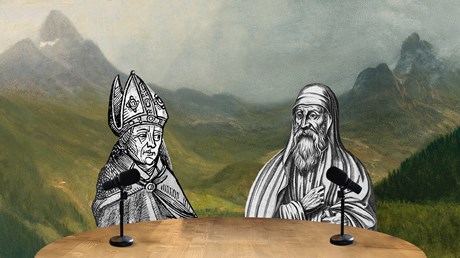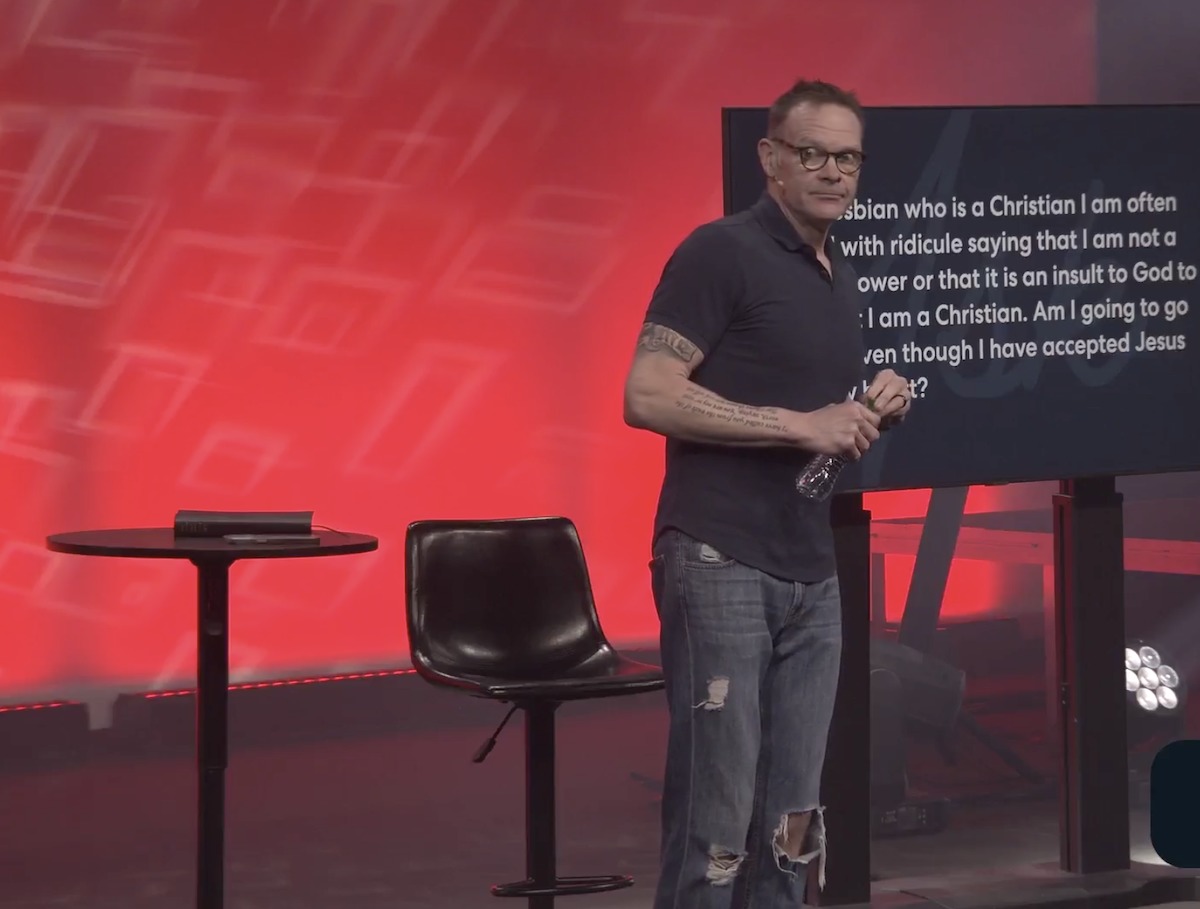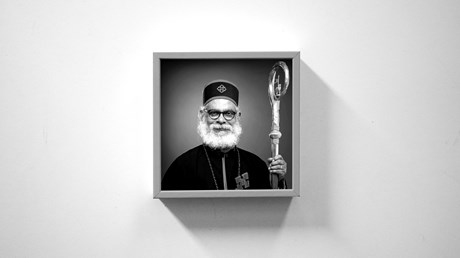Searched: Should
News
In the uncanny valley of the shadow of data, we should fear no evil—and prepare for a very different future.
 This piece was adapted from Russell Moore’s newsletter. Subscribe here.In the past several weeks, two events occurred that are going to change our futures. One of them was the launching of OpenAI’s new artificial intelligence program, GPT-4o, just ahead of several competitors who will do the same in a matter of weeks. The other was the defrocking of a robot priest for teaching that baptisms could be done with Gatorade. I’m afraid the church is not ready for either.The more talked-about happening was the OpenAI announcement, complete with videos of the AI program laughing, seeming to blush, telling jokes, seeing and describing things in real time, and even singing songs made up on the spot (to whatever degree of emotion and enthusiasm was demanded).Far less culturally noticed was the fact that just a few weeks before, the Roman Catholic apologetics platform Catholic Answers reined in an AI chatbot called “Father Justin,” which was designed to help people through questions of doctrine and practice.People started to get upset when Father Justin started claiming to be an actual priest, capable of hearing confession and offering sacraments, and when it started giving unorthodox answers to questions, such as whether baptizing a baby with Gatorade would be all right in an emergency (the magisterium says no).Now Father Justin is just “Justin,” a “lay theologian.” Catholic Answers acknowledged to critics that they are pioneering a new technological landscape and learning—as the whole world will—just how difficult it is to keep an artificial intelligence orthodox. If my Catholic friends thought Martin Luther was bad, wait until the robots start posting theses to the ...Continue reading... This piece was adapted from Russell Moore’s newsletter. Subscribe here.In the past several weeks, two events occurred that are going to change our futures. One of them was the launching of OpenAI’s new artificial intelligence program, GPT-4o, just ahead of several competitors who will do the same in a matter of weeks. The other was the defrocking of a robot priest for teaching that baptisms could be done with Gatorade. I’m afraid the church is not ready for either.The more talked-about happening was the OpenAI announcement, complete with videos of the AI program laughing, seeming to blush, telling jokes, seeing and describing things in real time, and even singing songs made up on the spot (to whatever degree of emotion and enthusiasm was demanded).Far less culturally noticed was the fact that just a few weeks before, the Roman Catholic apologetics platform Catholic Answers reined in an AI chatbot called “Father Justin,” which was designed to help people through questions of doctrine and practice.People started to get upset when Father Justin started claiming to be an actual priest, capable of hearing confession and offering sacraments, and when it started giving unorthodox answers to questions, such as whether baptizing a baby with Gatorade would be all right in an emergency (the magisterium says no).Now Father Justin is just “Justin,” a “lay theologian.” Catholic Answers acknowledged to critics that they are pioneering a new technological landscape and learning—as the whole world will—just how difficult it is to keep an artificial intelligence orthodox. If my Catholic friends thought Martin Luther was bad, wait until the robots start posting theses to the ...Continue reading... |
We can humbly seek their wisdom without treating them as mascots for one position or another.
 On September 11, 2020, I found myself under a large tent, where 51 ministers of the Reformed Presbyterian Church had assembled for a COVID-era presbytery. They gathered to receive charges against me, initiating an ecclesiastical trial. I had published a book that affirmed the possibility of theistic evolution—a view regarded by some as dangerous.Through that process, I became personally (and painfully) aware of how heated Genesis 1 controversies continue to be. My trial was ultimately dropped, but I was compelled to resign my pastorate and leave that denomination.I still love the Reformed Presbyterian Church and am grateful for my decades as a student and minister among its people. But I grieve that such passions for certain interpretations of Genesis 1 lead to damaged relationships and truncated ministries. It should not be so.There are already plenty of Genesis 1 studies on offer (including my own, called The Liturgy of Creation). But what the church really needs are more resources to help us engage these discussions more responsibly. Andrew J. Brown’s latest book, Recruiting the Ancients for the Creation Debate, is just such a resource.Brown, an Old Testament lecturer at Melbourne School of Theology, takes no sides on the question of whether the six days of creation are literal or figurative days. Recruiting the Ancients is not an attempt to solve creation controversies. Instead, it surveys what historic church authorities had to say on the subject, arguing that they shouldn’t be enlisted as straightforward allies of this or that contemporary position.The book is based on Brown’s earlier book on the same topic (The Days of Creation: A History of Christian Interpretation of Genesis 1:1–2:3), ...Continue reading... On September 11, 2020, I found myself under a large tent, where 51 ministers of the Reformed Presbyterian Church had assembled for a COVID-era presbytery. They gathered to receive charges against me, initiating an ecclesiastical trial. I had published a book that affirmed the possibility of theistic evolution—a view regarded by some as dangerous.Through that process, I became personally (and painfully) aware of how heated Genesis 1 controversies continue to be. My trial was ultimately dropped, but I was compelled to resign my pastorate and leave that denomination.I still love the Reformed Presbyterian Church and am grateful for my decades as a student and minister among its people. But I grieve that such passions for certain interpretations of Genesis 1 lead to damaged relationships and truncated ministries. It should not be so.There are already plenty of Genesis 1 studies on offer (including my own, called The Liturgy of Creation). But what the church really needs are more resources to help us engage these discussions more responsibly. Andrew J. Brown’s latest book, Recruiting the Ancients for the Creation Debate, is just such a resource.Brown, an Old Testament lecturer at Melbourne School of Theology, takes no sides on the question of whether the six days of creation are literal or figurative days. Recruiting the Ancients is not an attempt to solve creation controversies. Instead, it surveys what historic church authorities had to say on the subject, arguing that they shouldn’t be enlisted as straightforward allies of this or that contemporary position.The book is based on Brown’s earlier book on the same topic (The Days of Creation: A History of Christian Interpretation of Genesis 1:1–2:3), ...Continue reading... |
 |
By Paul Mueller Nobel Prize–winning economist Esther Duflo thinks rich countries should pay poor countries $500 billion in compensation each year for climate-change damages. It...Climate “Reparations” Numbers Are Rigged
|
Speech was not God's only miracle at Pentecost. The Spirit also gave the gift of understanding, overcoming division and contempt.
 Tongues of fire, everywhere. In this loud and furious age, a time of protests and counter-protests, words come burning, singeing, scalding, stinging.“Everyone should be quick to listen, slow to speak and slow to become angry,” James wrote, “because human anger does not produce the righteousness that God desires” (1:19–20). But few of us—even those of us who follow Christ—seem to believe that listening more than we speak could possibly meet the reality of these days.We give into the temptation of “thinking the times require using the tools of the enemy,” as Michael Wear says in The Spirit of Our Politics. We justify our tongues of fire as “just the way you play the game,” disregarding our trail of destruction—great forests put to waste by the sparks from our lips (3:5–8).Of course, there’s nothing new under the sun. Rage travels more quickly by gigahertz than messenger, but our era is not uniquely chaotic or tumultuous. The church has lived through worse, not least the dangerous early days after Christ’s resurrection and ascension.“[I’ve] been jailed … beaten up more times than I can count, and at death’s door time after time,” recounted the apostle Paul of his ministry in that time. “I’ve been flogged five times with the Jews’ thirty-nine lashes, beaten by Roman rods three times, pummeled with rocks once. … I’ve had to ford rivers, fend off robbers, struggle with friends, struggle with foes. I’ve been at risk in the city, at risk in the country, endangered by desert sun and sea storm, and betrayed by those I thought were my brothers” (2 Cor. 11:23–27, MSG). ...Continue reading... Tongues of fire, everywhere. In this loud and furious age, a time of protests and counter-protests, words come burning, singeing, scalding, stinging.“Everyone should be quick to listen, slow to speak and slow to become angry,” James wrote, “because human anger does not produce the righteousness that God desires” (1:19–20). But few of us—even those of us who follow Christ—seem to believe that listening more than we speak could possibly meet the reality of these days.We give into the temptation of “thinking the times require using the tools of the enemy,” as Michael Wear says in The Spirit of Our Politics. We justify our tongues of fire as “just the way you play the game,” disregarding our trail of destruction—great forests put to waste by the sparks from our lips (3:5–8).Of course, there’s nothing new under the sun. Rage travels more quickly by gigahertz than messenger, but our era is not uniquely chaotic or tumultuous. The church has lived through worse, not least the dangerous early days after Christ’s resurrection and ascension.“[I’ve] been jailed … beaten up more times than I can count, and at death’s door time after time,” recounted the apostle Paul of his ministry in that time. “I’ve been flogged five times with the Jews’ thirty-nine lashes, beaten by Roman rods three times, pummeled with rocks once. … I’ve had to ford rivers, fend off robbers, struggle with friends, struggle with foes. I’ve been at risk in the city, at risk in the country, endangered by desert sun and sea storm, and betrayed by those I thought were my brothers” (2 Cor. 11:23–27, MSG). ...Continue reading... |
As a physician, I witness countless first and last breaths. As a Christian, I am constantly reminded of how God breathes life into us through his Spirit.
 The scalpel sliced through the uterine wall. The amniotic sac ruptured, and fluid flowed across the blue surgical drapery toward me. The obstetrician’s fingers curled around the baby’s head while my gloved hands pressed firmly against the mother’s abdomen. The baby was larger than we had expected. I shifted my full body weight against the mother’s belly, and, at last, the newborn’s head slipped through. Her shoulders quickly followed, and there she lay, eyes taking in the bright world for the first time.Before she could cry, she took her first breath. Air rushed in, pushing aside fluid that had filled her lungs from six weeks of gestation. The oxygen diffused through the blood vessels of the alveoli, tiny air sacs within her lungs, relaxing the pulmonary arteries and allowing blood to course through her lungs for the first time. The short vessel connecting her lung arteries and heart began to close. Pressure built in her heart, causing the tiny hole between its chambers to snap shut.She breathed more vigorously than anyone else in the operating room, her purple hue softening to a rich pink. Squinting against the glaring light above, she cried again. What a foreign world this is—where air becomes breath, and then breath returns to air.Ruach is a Hebrew word meaning breath, wind, or spirit. (In the Septuagint, an ancient Greek translation of the Old Testament, it is rendered as pneuma or pneumon, the roots from which we get many English words pertaining to lungs.)In Genesis, ruach is both the Spirit of God bringing light and order into an unordered world (1:1–4) and the breath of life that God breathes into Adam (2:7). Psalm 33:6 says, “By the word of ...Continue reading... The scalpel sliced through the uterine wall. The amniotic sac ruptured, and fluid flowed across the blue surgical drapery toward me. The obstetrician’s fingers curled around the baby’s head while my gloved hands pressed firmly against the mother’s abdomen. The baby was larger than we had expected. I shifted my full body weight against the mother’s belly, and, at last, the newborn’s head slipped through. Her shoulders quickly followed, and there she lay, eyes taking in the bright world for the first time.Before she could cry, she took her first breath. Air rushed in, pushing aside fluid that had filled her lungs from six weeks of gestation. The oxygen diffused through the blood vessels of the alveoli, tiny air sacs within her lungs, relaxing the pulmonary arteries and allowing blood to course through her lungs for the first time. The short vessel connecting her lung arteries and heart began to close. Pressure built in her heart, causing the tiny hole between its chambers to snap shut.She breathed more vigorously than anyone else in the operating room, her purple hue softening to a rich pink. Squinting against the glaring light above, she cried again. What a foreign world this is—where air becomes breath, and then breath returns to air.Ruach is a Hebrew word meaning breath, wind, or spirit. (In the Septuagint, an ancient Greek translation of the Old Testament, it is rendered as pneuma or pneumon, the roots from which we get many English words pertaining to lungs.)In Genesis, ruach is both the Spirit of God bringing light and order into an unordered world (1:1–4) and the breath of life that God breathes into Adam (2:7). Psalm 33:6 says, “By the word of ...Continue reading... |
One of the NFL's top placekickers urged graduates during a commencement speech to prioritize their faith over their career and to resist the “lies” society teaches about gender, saying they should “move closer and closer to God's will” instead of living a work-centric life.
|
 |
? Temple Baptist Church - 5-15-2024John 16:7-15? Introduction:? A. Once again, let me reiterate that this will not be a Systematic Theology study of Pneumatology. But because of the context found in John 14-16, we find some important things about the Person and Word of the Holy Spirit. The Person is the Holy Spirit and when speaking of the work of the Holy Spirit, the name the Holy Ghost is used.? B. Last week, I “scratched the surface” on two things: the Work of the Comforter to the comfortless. The disciples' hearts were “filled with sorrow.” Two words need to be explained: Comforter and comfortless:? 1. Comforter (παράκλητος? paraklētos? par-ak'-lay-tos)? in the Greek means to be summoned to the side of or to come to the aid of the comfortless. Our Lord said that it was “expedient” that He went away but would pray the Father to send the Comforter in Christ's stead. While Christ comforted the disciples for 3 ½ years, the Comforter would abide with them forever.? John 14:16 And I will pray the Father, and he shall give you another Comforter, that he may abide with you for ever;? 2. Comfortless in the Greek comes from the word Greek word? ὀρφανός? orphanos? or-fan-os'? from which we get our English word orphan. Orphans have no families but the child of God has a spiritual family: our Father which is in heaven; our Saviour and Friend who love us; and the Holy Spirit that indwells us. Aren't you glad that you are not an orphan.? John 14:18 I will not leave you comfortless: I will come to you.? Psalms 27:10 When my father and my mother forsake me, then the LORD will take me up.? All of our sorrows, come what may! Death, sickness, persecutions, trials and tribulations, personal failure, discouragement, disappointment, defilement, both real and imagined. He will not leave us comfortless: orphaned!? C. The Second name given to the Holy Spirit is the “Spirit of truth,” which I will look at in a little more detail tonight.? John 14:17 Even the Spirit of truth; whom the world cannot receive, because it seeth him not, neither knoweth him: but ye know him; for he dwelleth with you, and shall be in you.? D. Why do people not get saved and why do some saved never grow? The verses that we read to night are the problem.? 1. There are those who reject Christ CANNOT know the truth. “seeth him not … neither knoweth him”? 1 Corinthians 2:11-14 For what man knoweth the things of a man, save the spirit of man which is in him? even so the things of God knoweth no man, but the Spirit of God. (12) Now we have received, not the spirit of the world, but the spirit which is of God; that we might know the things that are freely given to us of God. (13) Which things also we speak, not in the words which man's wisdom teacheth, but which the Holy Ghost teacheth; comparing spiritual things with spiritual. (14) But the natural man receiveth not the things of the Spirit of God: for they are foolishness unto him: neither can he know them, because they are spiritually discerned.? 2. Both lost and the carnal saint oft times who reject the Bible CANNOT know the truth! The truth is available in our day.? Zechariah 7:11-12 But they refused to hearken, and pulled away the shoulder, and stopped their ears, that they should not hear. (12) Yea, they made their hearts as an adamant stone, lest they should hear the law, and the words which the LORD of hosts hath sent in his spirit by the former prophets: therefore came a great wrath from the LORD of hosts.? Acts 7:54-57 When they heard these things, they were cut to the heart, and they gnashed on him with their teeth. (55) But he, being full of the Holy Ghost, looked up stedfastly into heaven, and saw the glory of God, and Jesus standing on the right hand of God, (56) And said, Behold, I see the heavens opened, and the Son of man standing on the right hand of God. (57) Then they cried out with a loud voice, and stopped their ears, and ran upon him with one accord,? E. The Work of the Spirit of Truth:? 1. Verse 8.? John 16:8 And when he is come, he will reprove the world of sin, and of righteousness, and of judgment:? a.? The Holy Spirit teaches us about Sin.? John 16:9 Of sin, because they believe not on me;? 1)? The Truth about Adamic Sin.? Romans 5:12a Wherefore, as by one man sin entered into the world, and death by sin;? Psalms 58:3 The wicked are estranged from the womb: they go astray as soon as they be born, speaking lies.? 2) The Truth about Willful Sin.? Romans 5:12b and so death passed upon all men, for that all have sinned:? Romans 3:23 For all have sinned, and come short of the glory of God;? 3) The Truth about Recompense for Sin.? a) Temporal Recompense.? Romans 6:23 For the wages of sin is death; but the gift of God is eternal life through Jesus Christ our Lord.? b) Eternal Sense. Revelation 20:15 And whosoever was not found written in the book of life was cast into the lake of fire.? b. The Holy Spirit teaches us about Righteousness.? John 16:10 Of righteousness, because I go to my Father, and ye see me no more;? 1) Lack of Righteousness of the Sinner.? Isaiah 64:6 But we are all as an unclean thing, and all our righteousnesses are as filthy rags; and we all do fade as a leaf; and our iniquities, like the wind, have taken us away.? 2) Perfect Righteousness of the Saviour.? Romans 10:3-4 For they being ignorant of God's righteousness, and going about to establish their own righteousness, have not submitted themselves unto the righteousness of God. (4) For Christ is the end of the law for righteousness to every one that believeth.? 3) Imputed Righteousness of the Saint.? Romans 4:20-25 He staggered not at the promise of God through unbelief; but was strong in faith, giving glory to God; (21) And being fully persuaded that, what he had promised, he was able also to perform. (22) And therefore it was imputed to him for righteousness. (23) Now it was not written for his sake alone, that it was imputed to him; (24) But for us also, to whom it shall be imputed, if we believe on him that raised up Jesus our Lord from the dead; (25) Who was delivered for our offences, and was raised again for our justification.? 3. The Holy Spirit teaches us about Judgment.? John 16:11 Of judgment, because the prince of this world is judged.? a) The Judgment of Satan and fallen angels. Matthew 25:41 Then shall he say also unto them on the left hand, Depart from me, ye cursed, into everlasting fire, prepared for the devil and his angels:? Revelation 20:10 And the devil that deceived them was cast into the lake of fire and brimstone, where the beast and the false prophet are, and shall be tormented day and night for ever and ever.? b) The Judgment of Sinners and their works.? Revelation 20:11-15 And I saw a great white throne, and him that sat on it, from whose face the earth and the heaven fled away; and there was found no place for them. (12) And I saw the dead, small and great, stand before God; and the books were opened: and another book was opened, which is the book of life: and the dead were judged out of those things which were written in the books, according to their works. (13) And the sea gave up the dead which were in it; and death and hell delivered up the dead which were in them: and they were judged every man according to their works. (14) And death and hell were cast into the lake of fire. This is the second death. (15) And whosoever was not found written in the book of life was cast into the lake of fire.? 2. Verse 12-13.? John 16:12-13 I have yet many things to say unto you, but ye cannot bear them now. (13) Howbeit when he, the Spirit of truth, is come, he will guide you into all truth: for he shall not speak of himself; but whatsoever he shall hear, that shall he speak: and he will shew you things to come.? a. In Depth Teaching. “he will guide you into all truth”? Colossians 1:9 For this cause we also, since the day we heard it, do not cease to pray for you, and to desire that ye might be filled with the knowledge of his will in all wisdom and spiritual understanding;? b. In Inspired Revelation. “and he will shew you things to come.” The canon of Scripture was not Plenary until after the death of the Apostles as they would continue to write under the inspiration of God in their lives. After their death, the canon of Scripture was Plenary, complete.? 2 Peter 1:21 For the prophecy came not in old time by the will of man: but holy men of God spake as they were moved by the Holy Ghost.? c. In Prophecy. Eschatology. Things to come. Knowing what the future holds and Who holds the future, we can face tomorrow and all our tomorrows in faith confidence through faith. “I do not know what tomorrow holds, but I know Who holds tomorrow and Who holds my life in His hands!”? Romans 8:38-39 For I am persuaded, that neither death, nor life, nor angels, nor principalities, nor powers, nor things present, nor things to come, (39) Nor height, nor depth, nor any other creature, shall be able to separate us from the love of God, which is in Christ Jesus our Lord.? ? 3. Verse 14. John 16:14 He shall glorify me: for he shall receive of mine, and shall shew it unto you.? a. The Holy Spirit does not speak of or exalt Himself. Be careful around people who constantly speak of the Holy Spirit or Holy Ghost.? b. The Holy spirit ALWAYS glorifies the Saviour and not Himself! We certainly honor and love Him, but He only speaks of and directs us to our Lord.
|
 Former megachurch Pastor Perry Noble didn't mince words when he criticized ministry leaders who say women shouldn't preach during a sermon earlier this month. Former megachurch Pastor Perry Noble didn't mince words when he criticized ministry leaders who say women shouldn't preach during a sermon earlier this month. |
I believe President Biden should be drug-tested before the presidential debates. I explain why in my Newsmax show. Watch below […]
|
For all his greatness, we should most seek to imitate the late pastor's humility and indifference to fame.
 In spring of last year, many of us saw a photo of the late Timothy Keller sitting on a park bench. The photo was used on the cover of Collin Hansen’s biography of Keller, and it circulated around the internet in May when he passed away—on social media, blogs, and even Keller’s personal website.What most of us didn’t see, however, was the banana peel lying on the bench only a couple feet from Keller. The peel has been cropped from most versions of the photo, and understandably so. Who wants to see an ugly brown bit of organic waste in an author’s photograph?I confess that if I were a world-famous pastor and best-selling author having my picture taken by a professional photographer, I would most certainly have moved the banana peel before someone took my picture. Who wouldn’t? But Keller didn’t seem to care.I believe this points to a deeper character trait of Keller’s, which many observed during his lifetime of ministry: an indifference to fame and to curating an image—something many of us struggle with in the social media era. This is also part of why, I believe, he finished his race so well.Finishing well in life and ministry has been historically difficult for believers, especially for those in positions of leadership. Think of Gideon or Solomon in the Old Testament, Demas in the New Testament, or, of course, the many church leaders today who have infamously failed to persevere.The esteem that leaders receive from the Christian community can allow for hidden flaws to grow like rust on the hull of a ship, unnoticed and unaddressed at first. But as these leaders reach greater influence, greater weight is placed on these flaws—which can reach ...Continue reading... In spring of last year, many of us saw a photo of the late Timothy Keller sitting on a park bench. The photo was used on the cover of Collin Hansen’s biography of Keller, and it circulated around the internet in May when he passed away—on social media, blogs, and even Keller’s personal website.What most of us didn’t see, however, was the banana peel lying on the bench only a couple feet from Keller. The peel has been cropped from most versions of the photo, and understandably so. Who wants to see an ugly brown bit of organic waste in an author’s photograph?I confess that if I were a world-famous pastor and best-selling author having my picture taken by a professional photographer, I would most certainly have moved the banana peel before someone took my picture. Who wouldn’t? But Keller didn’t seem to care.I believe this points to a deeper character trait of Keller’s, which many observed during his lifetime of ministry: an indifference to fame and to curating an image—something many of us struggle with in the social media era. This is also part of why, I believe, he finished his race so well.Finishing well in life and ministry has been historically difficult for believers, especially for those in positions of leadership. Think of Gideon or Solomon in the Old Testament, Demas in the New Testament, or, of course, the many church leaders today who have infamously failed to persevere.The esteem that leaders receive from the Christian community can allow for hidden flaws to grow like rust on the hull of a ship, unnoticed and unaddressed at first. But as these leaders reach greater influence, greater weight is placed on these flaws—which can reach ...Continue reading... |
President Biden should be tested for performance-enhancing drugs before he sets foot on the debate stage. Agree or disagree? Give […]
|
With recent shootings in public and in churches, the question of self-defense has been coming up lately. But first, let's be clear: What we are seeing today is not a gun problem; it's a moral problem called sin.?
|
From 1978 to 2008, he fought for legal recognition and freedom to worship for the Anabaptist denomination.
 Nguyen Quang Trung spent 30 years trying to get the Mennonite church recognized and registered by the government of Vietnam so that believers could meet and worship legally. When he finally succeeded, he celebrated the triumph with the words of the apostle Paul: “If we live, we live for the Lord; and if we die, we die for the Lord. So, whether we live or die, we belong to the Lord” (Rom. 14:8).Nguyen, a pastor and two-time president of Hội Thánh Mennonite Việt Nam (Vietnam Mennonite Church), died on March 23 at age 84. He was known for his “patient persistence” and “tireless efforts to promote and legally confirm a Mennonite presence in Vietnam,” Gerry Keener, former head of Eastern Mennonite Missions, told Anabaptist World.Nguyen was born in Gia Dinh, an industrial area outside Saigon. His mother died when he was five. His father was a committed Christian who raised him in the Evangelical Church of Vietnam, part of the Christian and Missionary Alliance.In his 20s, Nguyen found himself drawn to the Mennonites, spending a lot of time in a reading room established by the Eastern Mennonite Board of Missions and Charities. He took classes on English and the Bible and learned the Anabaptist teachings about nonviolence.“The same Spirit that empowered Jesus also empowers us to love enemies,” the missionaries taught Nguyen, “to forgive rather than to seek revenge, to practice right relationships, to rely on the community of faith to settle disputes, and to resist evil without violence.”Nguyen embraced the idea that Christians should “follow Christ in the way of peace” and practice “nonresistance,” even if they faced persecution and death.The ...Continue reading... Nguyen Quang Trung spent 30 years trying to get the Mennonite church recognized and registered by the government of Vietnam so that believers could meet and worship legally. When he finally succeeded, he celebrated the triumph with the words of the apostle Paul: “If we live, we live for the Lord; and if we die, we die for the Lord. So, whether we live or die, we belong to the Lord” (Rom. 14:8).Nguyen, a pastor and two-time president of Hội Thánh Mennonite Việt Nam (Vietnam Mennonite Church), died on March 23 at age 84. He was known for his “patient persistence” and “tireless efforts to promote and legally confirm a Mennonite presence in Vietnam,” Gerry Keener, former head of Eastern Mennonite Missions, told Anabaptist World.Nguyen was born in Gia Dinh, an industrial area outside Saigon. His mother died when he was five. His father was a committed Christian who raised him in the Evangelical Church of Vietnam, part of the Christian and Missionary Alliance.In his 20s, Nguyen found himself drawn to the Mennonites, spending a lot of time in a reading room established by the Eastern Mennonite Board of Missions and Charities. He took classes on English and the Bible and learned the Anabaptist teachings about nonviolence.“The same Spirit that empowered Jesus also empowers us to love enemies,” the missionaries taught Nguyen, “to forgive rather than to seek revenge, to practice right relationships, to rely on the community of faith to settle disputes, and to resist evil without violence.”Nguyen embraced the idea that Christians should “follow Christ in the way of peace” and practice “nonresistance,” even if they faced persecution and death.The ...Continue reading... |
The champion of “native missions” trained more than 100,000 evangelists but got in trouble for financial mismanagement.
 Athanasius Yohannan, who built one of the world’s largest mission organizations on the idea that Western Christians should support “native missionaries” but got in trouble for financial irregularities and dishonest fundraising, died on May 8. He was 74 and got hit by a car while walking along the road near his ministry headquarters in Texas.Born Kadapilaril Punnoose Yohannan and known for most of his ministry as K. P., Yohannan founded Gospel for Asia in 1979. Over the next 45 years, the organization trained more than 100,000 people to preach the gospel and plant and pastor churches in India, Bangladesh, Nepal, Sri Lanka, and other places in Southeast Asia, according to a recent ministry report. Gospel for Asia raised as much as $93 million in a year and in 2005 reported it was supporting about 14,500 indigenous evangelists and pastors in same-culture and near-culture ministry. Christians in the US were asked to give $30 per month to support them.“If we evangelize the world’s lost billions … it will be through native missions,” Yohannan wrote for CT. “The native missionary is far more effective than the expatriate. The national already knows the language and is already part of the culture. In many instances, he or she can go places where outsiders cannot go.”Yohannan’s death was mourned by Gospel for Asia, the church that he started and served as metropolitan bishop, and prominent political leaders in India.“He will be remembered for his service to society and emphasis on improving the quality of life of the downtrodden,” Prime Minister Narendra Modi wrote on social media. “May his soul rest in peace.”Both the governor of Kerala and the ...Continue reading... Athanasius Yohannan, who built one of the world’s largest mission organizations on the idea that Western Christians should support “native missionaries” but got in trouble for financial irregularities and dishonest fundraising, died on May 8. He was 74 and got hit by a car while walking along the road near his ministry headquarters in Texas.Born Kadapilaril Punnoose Yohannan and known for most of his ministry as K. P., Yohannan founded Gospel for Asia in 1979. Over the next 45 years, the organization trained more than 100,000 people to preach the gospel and plant and pastor churches in India, Bangladesh, Nepal, Sri Lanka, and other places in Southeast Asia, according to a recent ministry report. Gospel for Asia raised as much as $93 million in a year and in 2005 reported it was supporting about 14,500 indigenous evangelists and pastors in same-culture and near-culture ministry. Christians in the US were asked to give $30 per month to support them.“If we evangelize the world’s lost billions … it will be through native missions,” Yohannan wrote for CT. “The native missionary is far more effective than the expatriate. The national already knows the language and is already part of the culture. In many instances, he or she can go places where outsiders cannot go.”Yohannan’s death was mourned by Gospel for Asia, the church that he started and served as metropolitan bishop, and prominent political leaders in India.“He will be remembered for his service to society and emphasis on improving the quality of life of the downtrodden,” Prime Minister Narendra Modi wrote on social media. “May his soul rest in peace.”Both the governor of Kerala and the ...Continue reading... |
From 1978 to 2008, he fought for legal recognition and freedom to worship for the Anabaptist denomination.
 Nguyen Quang Trung spent 30 years trying to get the Mennonite church recognized and registered by the government of Vietnam so that believers could meet and worship legally. When he finally succeeded, he celebrated the triumph with the words of the apostle Paul: “If we live, we live for the Lord; and if we die, we die for the Lord. So, whether we live or die, we belong to the Lord” (Rom. 14:8).Nguyen, a pastor and two-time president of Hội Thánh Mennonite Việt Nam (Vietnam Mennonite Church), died on March 23 at age 84. He was known for his “patient persistence” and “tireless efforts to promote and legally confirm a Mennonite presence in Vietnam,” Gerry Keener, former head of Eastern Mennonite Missions, told Anabaptist World.Nguyen was born in Gia Dinh, an industrial area outside Saigon. His mother died when he was five. His father was a committed Christian who raised him in the Evangelical Church of Vietnam, part of the Christian and Missionary Alliance.In his 20s, Nguyen found himself drawn to the Mennonites, spending a lot of time in a reading room established by the Eastern Mennonite Board of Missions and Charities. He took classes on English and the Bible and learned the Anabaptist teachings about nonviolence.“The same Spirit that empowered Jesus also empowers us to love enemies,” the missionaries taught Nguyen, “to forgive rather than to seek revenge, to practice right relationships, to rely on the community of faith to settle disputes, and to resist evil without violence.”Nguyen embraced the idea that Christians should “follow Christ in the way of peace” and practice “nonresistance,” even if they faced persecution and death.The ...Continue reading... Nguyen Quang Trung spent 30 years trying to get the Mennonite church recognized and registered by the government of Vietnam so that believers could meet and worship legally. When he finally succeeded, he celebrated the triumph with the words of the apostle Paul: “If we live, we live for the Lord; and if we die, we die for the Lord. So, whether we live or die, we belong to the Lord” (Rom. 14:8).Nguyen, a pastor and two-time president of Hội Thánh Mennonite Việt Nam (Vietnam Mennonite Church), died on March 23 at age 84. He was known for his “patient persistence” and “tireless efforts to promote and legally confirm a Mennonite presence in Vietnam,” Gerry Keener, former head of Eastern Mennonite Missions, told Anabaptist World.Nguyen was born in Gia Dinh, an industrial area outside Saigon. His mother died when he was five. His father was a committed Christian who raised him in the Evangelical Church of Vietnam, part of the Christian and Missionary Alliance.In his 20s, Nguyen found himself drawn to the Mennonites, spending a lot of time in a reading room established by the Eastern Mennonite Board of Missions and Charities. He took classes on English and the Bible and learned the Anabaptist teachings about nonviolence.“The same Spirit that empowered Jesus also empowers us to love enemies,” the missionaries taught Nguyen, “to forgive rather than to seek revenge, to practice right relationships, to rely on the community of faith to settle disputes, and to resist evil without violence.”Nguyen embraced the idea that Christians should “follow Christ in the way of peace” and practice “nonresistance,” even if they faced persecution and death.The ...Continue reading... |
It wasn't only because of missionaries from the West, says a Tongan Australian theologian.
 Christian overseas missionaries were more successful in Oceania—the region spanning the Pacific Islands, Australia, Papua New Guinea, and New Zealand—than anywhere else in the world.In particular, people in the Pacific Islands (which include Fiji, Papua New Guinea, Samoa, Vanuatu, Tonga, and more) were receptive to the gospel because “their ancestors’ strong beliefs in a divine presence and in the afterlife made them very open to Christian faith,” wrote Jacqueline Ryle, a contributor to the 2021 reference volume Christianity in Oceania. Tongan Australian theologian Katalina Tahaafe-Williams says her research reveals the same: The growth of Christianity in the region was not because of white Europeans but rather due to Indigenous missionaries who translated Christianity in a way that made sense to locals.Tahaafe-Williams, who lives in Sydney, served as the Indigenous coeditor for the book alongside prominent global Christianity scholars Kenneth R. Ross and Todd M. Johnson.“Our goal was to recruit Indigenous writers from all over the region to contribute to this volume,” she explained. “It was my task to connect with potential authors, theologians, leaders, and church members from the Pacific Islands … we were very committed to finding, however challenging it might be, authors who were part of that particular culture, thereby making the work very authentic.”CT Global books editor Geethanjali Tupps spoke with Tahaafe-Williams on why Christianity flourished in the Pacific Islands, how migration patterns have impacted the church, and why the region shouldn’t serve as the poster child for climate change issues.Continue reading... Christian overseas missionaries were more successful in Oceania—the region spanning the Pacific Islands, Australia, Papua New Guinea, and New Zealand—than anywhere else in the world.In particular, people in the Pacific Islands (which include Fiji, Papua New Guinea, Samoa, Vanuatu, Tonga, and more) were receptive to the gospel because “their ancestors’ strong beliefs in a divine presence and in the afterlife made them very open to Christian faith,” wrote Jacqueline Ryle, a contributor to the 2021 reference volume Christianity in Oceania. Tongan Australian theologian Katalina Tahaafe-Williams says her research reveals the same: The growth of Christianity in the region was not because of white Europeans but rather due to Indigenous missionaries who translated Christianity in a way that made sense to locals.Tahaafe-Williams, who lives in Sydney, served as the Indigenous coeditor for the book alongside prominent global Christianity scholars Kenneth R. Ross and Todd M. Johnson.“Our goal was to recruit Indigenous writers from all over the region to contribute to this volume,” she explained. “It was my task to connect with potential authors, theologians, leaders, and church members from the Pacific Islands … we were very committed to finding, however challenging it might be, authors who were part of that particular culture, thereby making the work very authentic.”CT Global books editor Geethanjali Tupps spoke with Tahaafe-Williams on why Christianity flourished in the Pacific Islands, how migration patterns have impacted the church, and why the region shouldn’t serve as the poster child for climate change issues.Continue reading... |
 Independent presidential candidate Robert F. Kennedy Jr. recently seemed to suggest he supports allowing abortion up until the moment of birth, prompting outrage from pro-life groups and concerns of insincerity among progressives in light of his previous moderate rhetoric on the issue.? Independent presidential candidate Robert F. Kennedy Jr. recently seemed to suggest he supports allowing abortion up until the moment of birth, prompting outrage from pro-life groups and concerns of insincerity among progressives in light of his previous moderate rhetoric on the issue.? |
A majority of American Protestants were raised by devout mothers, a study finds.
 The vast majority of American Christians were raised in the faith—and most can point to the influence of their moms.In a 2023 study, the American Bible Society found that a majority of believers remain in the same religious tradition as their mothers. This agrees with a large body of mainstream social science research dating back to the 1970s that says the active faith of mothers is a strong predictor of religious transmission.Some of this may be attributed to the natural bond children have with their mothers. But there is also research that shows that moms take a more active role in faith formation in America.A 2019 Barna Group survey found that Christian teenagers who say their faith is very important to them are 20 points more likely to talk to their moms about religion than their dads. More than 70 percent of Christian teenagers read the Bible, 70 percent talk about God, and 63 percent pray with their moms.Continue reading... The vast majority of American Christians were raised in the faith—and most can point to the influence of their moms.In a 2023 study, the American Bible Society found that a majority of believers remain in the same religious tradition as their mothers. This agrees with a large body of mainstream social science research dating back to the 1970s that says the active faith of mothers is a strong predictor of religious transmission.Some of this may be attributed to the natural bond children have with their mothers. But there is also research that shows that moms take a more active role in faith formation in America.A 2019 Barna Group survey found that Christian teenagers who say their faith is very important to them are 20 points more likely to talk to their moms about religion than their dads. More than 70 percent of Christian teenagers read the Bible, 70 percent talk about God, and 63 percent pray with their moms.Continue reading... |
By Paul Mueller Nobel Prize–winning economist Esther Duflo thinks rich countries should pay poor countries $500 billion in compensation each year for climate-change damages. It...Climate “Reparations” Numbers Are Rigged
|
The champion of “native missions” trained more than 100,000 evangelists but got in trouble for financial mismanagement.
 Athanasius Yohannan, who built one of the world’s largest mission organizations on the idea that Western Christians should support “native missionaries” but got in trouble for financial irregularities and dishonest fundraising, died on May 8. He was 74 and got hit by a car while walking along the road near his ministry headquarters in Texas.Born Kadapilaril Punnoose Yohannan and known for most of his ministry as K. P., Yohannan founded Gospel for Asia in 1979. Over the next 45 years, the organization trained more than 100,000 people to preach the gospel and plant and pastor churches in India, Bangladesh, Nepal, Sri Lanka, and other places in Southeast Asia, according to a recent ministry report. Gospel for Asia raised as much as $93 million in a year and in 2005 reported it was supporting about 14,500 indigenous evangelists and pastors in same-culture and near-culture ministry. Christians in the US were asked to give $30 per month to support them.“If we evangelize the world’s lost billions … it will be through native missions,” Yohannan wrote for CT. “The native missionary is far more effective than the expatriate. The national already knows the language and is already part of the culture. In many instances, he or she can go places where outsiders cannot go.”Yohannan’s death was mourned by Gospel for Asia, the church that he started and served as metropolitan bishop, and prominent political leaders in India.“He will be remembered for his service to society and emphasis on improving the quality of life of the downtrodden,” Prime Minister Narendra Modi wrote on social media. “May his soul rest in peace.”Both the governor of Kerala and the ...Continue reading... Athanasius Yohannan, who built one of the world’s largest mission organizations on the idea that Western Christians should support “native missionaries” but got in trouble for financial irregularities and dishonest fundraising, died on May 8. He was 74 and got hit by a car while walking along the road near his ministry headquarters in Texas.Born Kadapilaril Punnoose Yohannan and known for most of his ministry as K. P., Yohannan founded Gospel for Asia in 1979. Over the next 45 years, the organization trained more than 100,000 people to preach the gospel and plant and pastor churches in India, Bangladesh, Nepal, Sri Lanka, and other places in Southeast Asia, according to a recent ministry report. Gospel for Asia raised as much as $93 million in a year and in 2005 reported it was supporting about 14,500 indigenous evangelists and pastors in same-culture and near-culture ministry. Christians in the US were asked to give $30 per month to support them.“If we evangelize the world’s lost billions … it will be through native missions,” Yohannan wrote for CT. “The native missionary is far more effective than the expatriate. The national already knows the language and is already part of the culture. In many instances, he or she can go places where outsiders cannot go.”Yohannan’s death was mourned by Gospel for Asia, the church that he started and served as metropolitan bishop, and prominent political leaders in India.“He will be remembered for his service to society and emphasis on improving the quality of life of the downtrodden,” Prime Minister Narendra Modi wrote on social media. “May his soul rest in peace.”Both the governor of Kerala and the ...Continue reading... |
Aaron Renn outlines individual, institutional, and missional strategies for adapting to a hostile culture.
 Rarely does an essay cause such a stir as Aaron Renn’s “The Three Worlds of Evangelicalism.” Published in First Things in 2022, Renn’s framework for describing Christianity’s fall into cultural disfavor since the 1960s elicited a wide range of responses, from wholehearted agreement to sympathetic skepticism to vociferous disagreement, and seemingly everything in between.Renn’s essay categorizes the recent history of evangelicalism in the United States into three periods, or worlds. In the positive world, Christianity was in a position of cultural dominance; most Americans, even those who were not particularly religious, recognized the importance of Christianity to the country’s collective moral fabric. In the neutral world, the broader culture came to see Christianity not as uniquely good, but still as a belief system and worldview doing more good than harm.Since the early 2010s—the dates themselves, Renn admits, are not binding—evangelicalism has been in the negative world. Here, culture and its elites are inherently suspicious of evangelical Christianity, especially when it challenges or conflicts with emerging, more attractive ideologies. Christians in the negative world, according to Renn, will encounter resistance to previously acceptable beliefs and behaviors. This resistance could take many forms, from simple yet pronounced disagreement all the way to the dreaded C-word: cancellation.Less than two years after his essay, Renn’s book, Life in the Negative World: Confronting Challenges in an Anti-Christian Culture, updates and elaborates on his framework and provides tangible resources for Christians concerned about this cultural transformation. Renn’s ...Continue reading... Rarely does an essay cause such a stir as Aaron Renn’s “The Three Worlds of Evangelicalism.” Published in First Things in 2022, Renn’s framework for describing Christianity’s fall into cultural disfavor since the 1960s elicited a wide range of responses, from wholehearted agreement to sympathetic skepticism to vociferous disagreement, and seemingly everything in between.Renn’s essay categorizes the recent history of evangelicalism in the United States into three periods, or worlds. In the positive world, Christianity was in a position of cultural dominance; most Americans, even those who were not particularly religious, recognized the importance of Christianity to the country’s collective moral fabric. In the neutral world, the broader culture came to see Christianity not as uniquely good, but still as a belief system and worldview doing more good than harm.Since the early 2010s—the dates themselves, Renn admits, are not binding—evangelicalism has been in the negative world. Here, culture and its elites are inherently suspicious of evangelical Christianity, especially when it challenges or conflicts with emerging, more attractive ideologies. Christians in the negative world, according to Renn, will encounter resistance to previously acceptable beliefs and behaviors. This resistance could take many forms, from simple yet pronounced disagreement all the way to the dreaded C-word: cancellation.Less than two years after his essay, Renn’s book, Life in the Negative World: Confronting Challenges in an Anti-Christian Culture, updates and elaborates on his framework and provides tangible resources for Christians concerned about this cultural transformation. Renn’s ...Continue reading... |
The champion of “native missions” trained more than 100,000 evangelists but got in trouble for financial mismanagement.
 Athanasius Yohannan, who built one of the world’s largest mission organizations on the idea that Western Christians should support “native missionaries” but got in trouble for financial irregularities and dishonest fundraising, died on May 8. He was 74 and got hit by a car while walking along the road near his ministry headquarters in Texas.Born Kadapilaril Punnoose Yohannan and known for most of his ministry as K. P., Yohannan founded Gospel for Asia in 1979. Over the next 45 years, the organization trained more than 100,000 people to preach the gospel and plant and pastor churches in India, Bangladesh, Nepal, Sri Lanka, and other places in Southeast Asia, according to a recent ministry report. Gospel for Asia raised as much as $93 million in a year and in 2005 reported it was supporting about 14,500 indigenous evangelists and pastors in same-culture and near-culture ministry. Christians in the US were asked to give $30 per month to support them.“If we evangelize the world’s lost billions … it will be through native missions,” Yohannan wrote for CT. “The native missionary is far more effective than the expatriate. The national already knows the language and is already part of the culture. In many instances, he or she can go places where outsiders cannot go.”Yohannan’s death was mourned by Gospel for Asia, the church that he started and served as metropolitan bishop, and prominent political leaders in India.“He will be remembered for his service to society and emphasis on improving the quality of life of the downtrodden,” Prime Minister Narendra Modi wrote on social media. “May his soul rest in peace.”Both the governor of Kerala and the ...Continue reading... Athanasius Yohannan, who built one of the world’s largest mission organizations on the idea that Western Christians should support “native missionaries” but got in trouble for financial irregularities and dishonest fundraising, died on May 8. He was 74 and got hit by a car while walking along the road near his ministry headquarters in Texas.Born Kadapilaril Punnoose Yohannan and known for most of his ministry as K. P., Yohannan founded Gospel for Asia in 1979. Over the next 45 years, the organization trained more than 100,000 people to preach the gospel and plant and pastor churches in India, Bangladesh, Nepal, Sri Lanka, and other places in Southeast Asia, according to a recent ministry report. Gospel for Asia raised as much as $93 million in a year and in 2005 reported it was supporting about 14,500 indigenous evangelists and pastors in same-culture and near-culture ministry. Christians in the US were asked to give $30 per month to support them.“If we evangelize the world’s lost billions … it will be through native missions,” Yohannan wrote for CT. “The native missionary is far more effective than the expatriate. The national already knows the language and is already part of the culture. In many instances, he or she can go places where outsiders cannot go.”Yohannan’s death was mourned by Gospel for Asia, the church that he started and served as metropolitan bishop, and prominent political leaders in India.“He will be remembered for his service to society and emphasis on improving the quality of life of the downtrodden,” Prime Minister Narendra Modi wrote on social media. “May his soul rest in peace.”Both the governor of Kerala and the ...Continue reading... |
Aaron Renn outlines individual, institutional, and missional strategies for adapting to a hostile culture.
|



 Links
Links  Articles
Articles  Blogs
Blogs  Videos
Videos  News
News  Colors
Colors 

 New links
New links

